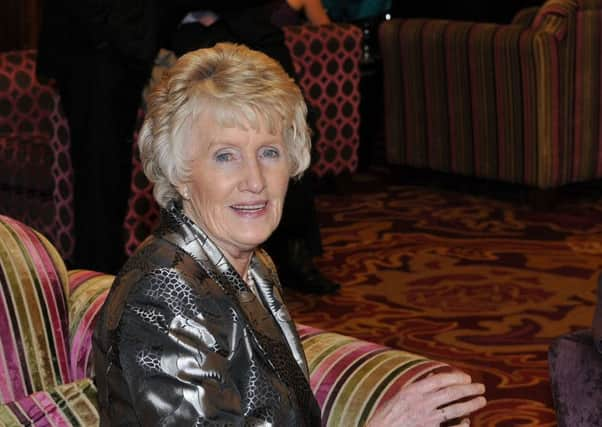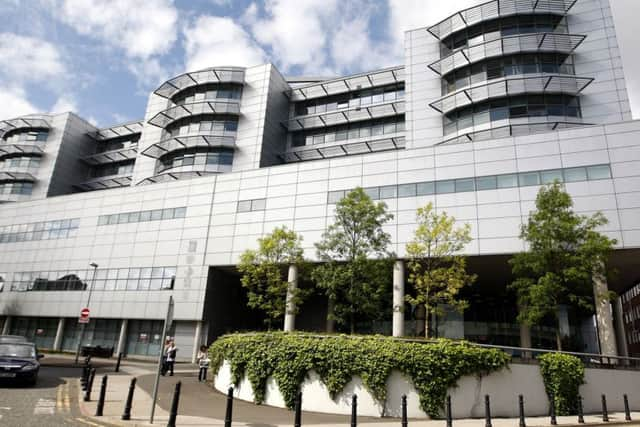Pensioner died after salon fall and '˜deficiencies' in care at RVH


The hearing in Belfast also heard how shortcomings in the care received by 80-year-old Brigid Heagney at the Royal Victoria Hospital led to an internal investigation and significant changes in emergency department procedures.
Mrs Heagney, of Dungannon Road in Cookstown, suffered sub-dural haematomas (bleeding on the brain) as a result of the incident at the Blow Dry Bar on Belfast’s Lisburn Road on November 2, 2013.
Advertisement
Hide AdAdvertisement
Hide AdMrs Heagney’s daughter, Anne-Marie McCrum, told coroner Mr Joseph McCrisken her mother had slipped on a wet floor at the salon, but the shop manager later gave evidence that the floor was dry at the time.


Trudy Stanfield, a Senior Environmental Health Officer with Belfast City Council, said the salon was inspected following Mrs Heagney’s fall and subsequently fined a total of £900 for five breaches of safety regulations - including a finding that the steps and tiles in the premises presented a risk to both employees and customers.
“The tiles were fine when dry but when they were wet they were very slippy,” Ms Stanfield said.
Mrs Heagney, was taken to the emergency department of the RVH where her daughter repeatedly stressed concern that her mother had suffered a heavy blow to her head - and was a higher risk of serious consequences due to the blood-thinning medication (Warfarin) she was taking.
Advertisement
Hide AdAdvertisement
Hide AdHowever, with all of Mrs Heagney’s vital signs initially relatively normal, she was assessed as a ‘Category 4’ risk - who should be seen by a doctor within two hours of triage - rather than the more appropriate ‘Category 2’ meaning a recommended wait of no more than ten minutes.


As a result, a doctor’s assessment was not carried out until 5pm. This was more than three hours after triage, and almost four and a half hours after the accident.
A first CT scan was taken at 6.32pm.
Triage nurse Emma Bates told the coroner that a head injury pro-forma which had recently been introduced had not been completed.
And when asked why the fact that Mrs Heagney was on anticoagulant medication was not brought to the attention of a doctor at the first opportunity, staff nurse Bates said: “I can’t remember if I asked the lady if she was on Warfarin.”
Advertisement
Hide AdAdvertisement
Hide AdThe court also heard how there were no blood samples taken during triage and that further lengthy delays occurred both in having samples taken and then analysed.
The coroner noted that it was three hours and twenty-five minutes (at 8.25pm) before the results of the blood test were known.
Dr Mawhinney, the first clinician to examine Mrs Heagney, was asked if he thought this delay was “a reasonable time”.
He replied “No.”
Dr Mawhinney confirmed that he marked the blood sample as urgent, but added: “I can’t account for the systematic delay. I can’t account for the time, I’m sorry.”
Advertisement
Hide AdAdvertisement
Hide AdThe most senior doctor on duty at the time, Dr Daniel McAleese, was asked if he thought Mrs Heagney’s outcome would have been better with earlier, appropriate intervention.
He said: “There would have been a better chance, but whether that chance would have been significantly better I don’t know.”
Octaplex medication to reverse the effects of Warfarin was eventually administered at 9.15pm and a second CT scan ordered as Mrs Heagney’s condition had deteriorated.
The extensive bleeding on the brain was deemed to be unsuitable for surgical intervention and Mrs Heagney was transferred to a palliative care ward where she died four days later on November 6.
Advertisement
Hide AdAdvertisement
Hide AdNeurosurgeon Mr Philip Weir said believed surgery in the circumstances would most likely have resulted in death or the patient being left in a vegetative state.
John Maxwell, clinical director for the Belfast Trust, said “people have learned from this,” and added: “The system should be better; you want the bloods back in a timely fashion.”
Coroner Mr McCrisken said: “The blood test was delayed because of deficiencies in the system in place in a busy emergency department. Octaplex was delayed as it was not stocked in the department.
“There were deficiencies in the treatment of Mrs Heagney. I am satisfied now, having listened to Dr Maxwell, that some of the practises are being examined in light of this case.”
Advertisement
Hide AdAdvertisement
Hide AdMr McCrisken found that Mrs Heagney died as a result of falling down two steps at the hairdressing salon, striking the left side of her head and her left arm.
• The death of Mrs Heagney, and a number of other people at the RVH, was the subject of a BBC Spotlight documentary in February 2014.
It was suspected that delays in being treated at the hospital’s emergency department could have contributed to the deaths of up to five patients.
At that time, the then medical director of the Belfast Trust Dr Tony Stevens told the BBC that some of the patients “may have succumbed or died anyway”.
Advertisement
Hide AdAdvertisement
Hide AdHe said some of the patients had not been seen for two or three hours after triage, when they should have been seen within an hour.
“This is something we’re not happy about, that their care could have been better and their outcome might have been different, but I need to reassure the public, you cannot assume that five patients came into our hospital and, for want of waiting longer than we would want to, they died.”